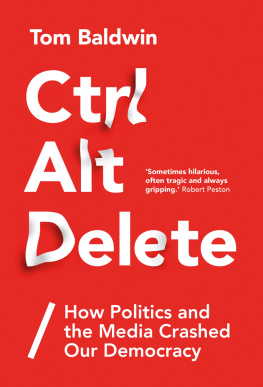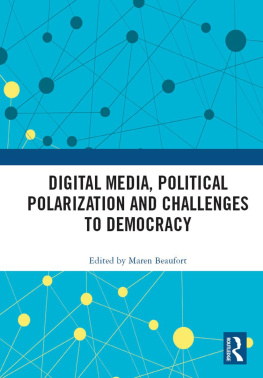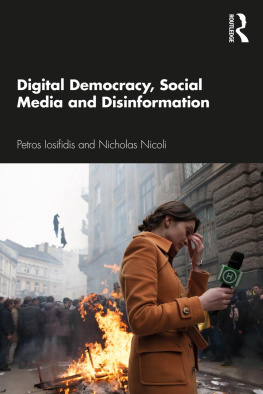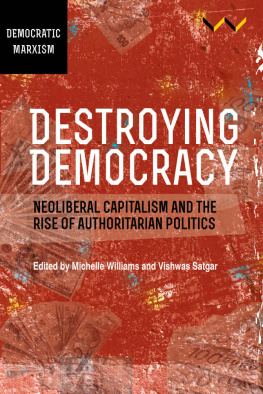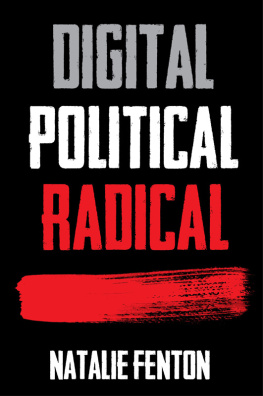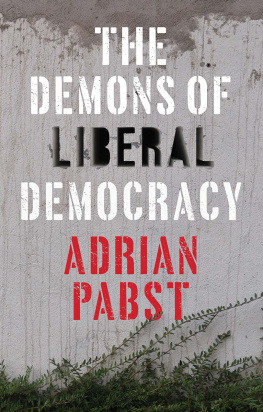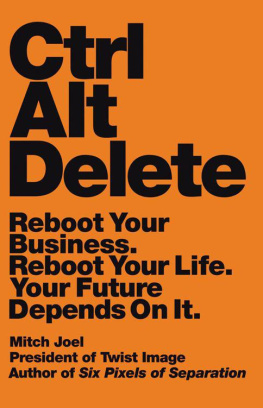Ctrl Alt Delete

First published in the United Kingdom in 2018 by
C. Hurst & Co. (Publishers) Ltd.,
41 Great Russell Street, London, WC1B 3PL
Tom Baldwin, 2018
All rights reserved.
The right of Tom Baldwin to be identified as the author of this publication is asserted by him in accordance with the Copyright, Designs and Patents Act, 1988.
A Cataloguing-in-Publication data record for this book is available from the British Library.
ISBN: 9781787381018
This book is printed using paper from registered sustainable and managed sources.
www.hurstpublishers.com
To Rebecca, Frankie and Arthur
And in loving memory of my parents, Robin and Sylvia Baldwin
Contents
Part One
The Battle For Control
Part Two
The Rise Of The Alternative
Part Three
Delete
There are people without whom this book would certainly not exist. Rebecca Nicolson, my wife, who has been a constant source of wise counsel, encouragement and tolerance. Marc Stears has provided a stream of ideas, energy and ad hoc political theory tutorials, even from the other side of the world. Georgina Capel, my agent, is a hugely positive and generous force of nature. Emma Craigie has given me brilliantly precise suggestions, as well as occasional reminders of the need for a degree of political balance. Emily Spence and Mathew Baldwin, my sister and brother, have watched my back and told me where I am going wrong in the way that only older siblings canespecially now that our much-missed parents have gone.
Many other friends have kindly read chapters and offered much-valued advice. They include Spencer Livermore, Aurea Carpenter, Rachel Sylvester, Alastair Campbell, Douglas Alexander, Patrick Wintour, Matthew McGregor, Andrew Cooper, Rachel Kinnock, Robert Peston and Roger Alton. I am also very grateful to Michael Dwyer, Jon de Peyer, Alison Alexanian and the whole team at Hurst Publishers for the patient and professional way they have published this book.
Although readers may notice I am critical of both the media and politics, I know both are filled with good people and I am far more appreciative than I might seem for the opportunities they have given me.
Most of all, I want to say thank you to my fantastic familyRebecca, Frankie and Arthurfor all the love and laughter they have given me. I would be utterly lost and even grumpier than usual without them.
Imagine being a weather forecaster and getting it wrong. Not just a bit wronglike predicting it will be a sunny day and finding yourself caught in showersbut wrong, wrong, wrong. So badly wrong, so catastrophically wrong, that people get stuck in snow blizzards and families freeze to death in their cars.
That is how much of the media and politics have felt after getting it wrong over and over again these last few years. When Jeremy Corbyn first ran for the Labour leadership, no oneincluding himreally thought he would win, let alone almost become Prime Minister. And, although the polls were close in the referendum on membership of the European Union, few people in either the Remain or Leave campaigns sincerely believed Britain would vote for Brexit. As for Donald Trump, who had initially acted as a joke candidate and was treated as such, he got himself elected president just 24 hours after some esteemed analysts estimated his chance of victory was between 1 and 2 per cent.
I was one of those who had pretended for so long that I knew Whats Going On, I had come to believe that I did. For the best part of twenty years I hustled around Westminster and Washington, my mobile phone hot against my ear, while I sought out scraps of information and intermittent access to power so that I could pass on my elite knowledge to readers of the Sunday Telegraph or The Times. Later, I slipped across the small patch of ground that is meant to separate the media from politics and, for a while, I got to offer little bits of access or information too.
But being part of Labours General Election campaign in 2015, which we lost by an unexpectedly wide margin, is one way to learn some humility. It certainly gave me time to reflect as, in the months that followed, evidence began to pile up that none of us who had played this game of elite knowledge could really claim to know very much about what was going on at all. Corbyn, Brexit, Trump, then Corbyn again: few saw them coming, I certainly didnt.
The sense of disorientation in the media and political mainstream was deeper than merely the shock of unexpected events, it shook the pillars of conventional wisdom. The values that seemed to be succeedingprotectionism, old-style socialism, nationalism, illiberalismwere precisely those we had confidently consigned to the past. Sure, the Iraq War, the rise of China and the global financial crisis, had caused some wobbles. But it was not until those most stable democracies of Britain and America started to vote in strange, compass-spinning ways, that confidence about what the future would look like came crashing down.
When I started writing this book, I was no longer cocksure about knowing what was going on. Instead, I wanted to use my conflicted perspective, derived from my time in the media and politics, to discover what had gone wrong with both over the past three decades. In short, I have sought to find out why the worlds I once understood, no longer understood the world.
It is a story that begins in the final years of the last century when everyone had more reason to be optimistic than perhaps at any time in history: Communism had collapsed across Eastern Europe, Apartheid was crumbling into dust in South Africa, nationalism was in retreat.
We were not wrong, back then, to be so excited. The big change coming down the tracks was about how information was produced, distributed and consumed. We were at the start of a new information age, a revolution powered by data and driven by technology, that over the next few years promised to break down old borders and overcome ancient prejudice, make people richer, create citizens who were contented because they were connected. For progressively-minded journalists and politicians it seemed like a pretty good bet that, because free information was the currency that a free press traded in free market democracies, the future belonged to people like us.
It was a forecast, an assumption, that turned out to be horribly wrong. At the time of writing, a malevolent Twitter-troll is in the White House as Leader of the Free World, a journalist who made his name inventing stories about Brussels banning prawn cocktail crisps is Britains Foreign Secretary, while an authoritarian nationalist leader of Russia sprays toxin over Western democracy. And, oh yes, the BBCs first female political editor needs a bodyguard to protect her from assault when she attends Labour Party events.
We had expected sunshine, but we have found ourselves in a hurricane. And what I have learnt in writing this book is that the hurricane did not just happen, we helped make it: we sowed the wind and reaped a whirlwind; and the blow-hard, abusive relationship that media and politics had with this new information age must take some of the blame for causing democracy to crash.
The title of this book, Ctrl Alt Delete, will be familiar to anyone who experienced Microsoft Windows crashing in the 1990s. Ctrl+Alt+Del was the three-fingered salute we used to restart our computers when they froze, as they often did, and that dread blue message appeared saying any unsaved data will be lost. The engineer who came up with Ctrl Alt Del, David Bradley, described his thinking: We had brand new hardware, brand new software, it would hang up all the time. The only solution you had was to turn the power off, wait a few seconds, and turn the power back on again. I said, Im writing all this code for the keyboards and we can just shortcut it.

